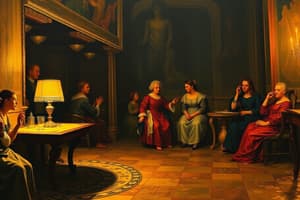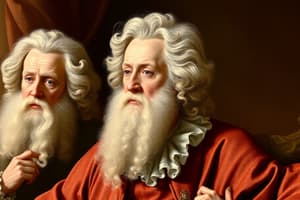Podcast
Questions and Answers
Which Enlightenment philosopher emphasized the importance of morality in society and the need for people to act according to reason rather than tradition or authority?
Which Enlightenment philosopher emphasized the importance of morality in society and the need for people to act according to reason rather than tradition or authority?
- Voltaire
- John Locke
- Immanuel Kant
- Jean-Jacques Rousseau (correct)
Which philosopher rejected traditional Jewish beliefs and embraced pantheism?
Which philosopher rejected traditional Jewish beliefs and embraced pantheism?
- Gottfried Wilhelm Leibniz
- John Locke
- Immanuel Kant
- Baruch Spinoza (correct)
Who proposed that individuals have inherent values and capacities that can be developed through education?
Who proposed that individuals have inherent values and capacities that can be developed through education?
- Montesquieu
- Baron de Montesquieu
- Jean-Jacques Rousseau (correct)
- Mary Wollstonecraft
Who among the philosophers presented a rationalist account of morality and human behavior in the work 'Ethics Demonstrated in Geometrical Order'?
Who among the philosophers presented a rationalist account of morality and human behavior in the work 'Ethics Demonstrated in Geometrical Order'?
Which philosopher posited that the universal principle of enlightenment is humanity's ability to make decisions independently without coercion or external influence?
Which philosopher posited that the universal principle of enlightenment is humanity's ability to make decisions independently without coercion or external influence?
Which philosopher argued for government by consent and the protection of individual property rights in the 'Two Treatises of Government'?
Which philosopher argued for government by consent and the protection of individual property rights in the 'Two Treatises of Government'?
Who among the following Enlightenment figures championed science and reason while being skeptical about organized religion?
Who among the following Enlightenment figures championed science and reason while being skeptical about organized religion?
Who is often considered a prime example of the radical Enlightenment?
Who is often considered a prime example of the radical Enlightenment?
Which Enlightenment thinker played a significant role in disseminating knowledge through letters and essays, promoting religious tolerance and civil liberties?
Which Enlightenment thinker played a significant role in disseminating knowledge through letters and essays, promoting religious tolerance and civil liberties?
Which Enlightenment philosopher significantly influenced subsequent philosophers despite being excommunicated from the Jewish community?
Which Enlightenment philosopher significantly influenced subsequent philosophers despite being excommunicated from the Jewish community?
Flashcards are hidden until you start studying
Study Notes
Enlightenment Philosophers
The Enlightenment, a period of intellectual awakening in the 18th century, produced some of the most influential philosophers who challenged established dogmas, advocated for individual freedoms, and contributed significantly to modern thought. Here are brief profiles of some prominent figures associated with the Enlightenment:
Baruch Spinoza
Baruch Spinoza (1632-1677), a Dutch philosopher, is often considered a prime example of the radical Enlightenment. He rejected traditional Jewish beliefs and embraced pantheism, the belief that God is present in all things. His work "Ethics Demonstrated in Geometrical Order," presented a rationalist account of morality and human behavior. Despite being excommunicated from the Jewish community, Spinoza's ideas influenced many subsequent philosophers, including Leibniz and the young Immanuel Kant.
John Locke
John Locke (1632-1704), an English philosopher, was a key figure in promoting liberalism during the Enlightenment period. His "Two Treatises of Government" argued for government by consent and the protection of individual property rights. This idea of limited government influenced political thought through the American Revolution and beyond.
Jean-Jacques Rousseau
Jean-Jacques Rousseau (1712-1778) was a Swiss philosopher who contributed to modern political, educational, and theoretical anthropology with his book "Discourses." He proposed that individuals have inherent values and capacities, which can be developed through education. He emphasized the importance of morality in society and the need for people to act according to reason rather than tradition or authority.
Voltaire
Voltaire (1694-1778), a French writer, historian, and philosopher, championed the ideals of the Enlightenment. Although he was skeptical about organized religion, he promoted science and reason in place of superstition. Notably, he played a significant role in disseminating knowledge through letters and essays, and was instrumental in promoting religious tolerance and civil liberties.
Immanuel Kant
Immanuel Kant (1724-1804) was a German philosopher whose work combined elements from both the continental and empiricist traditions. He argued that humans possess a unique capacity called 'practical reason,' which enables us to act freely and morally. His famous work "What Is Enlightenment?" posited that the universal principle of enlightenment lies in humanity's ability to make decisions independently without being coerced by others or influenced by external circumstances.
Studying That Suits You
Use AI to generate personalized quizzes and flashcards to suit your learning preferences.




